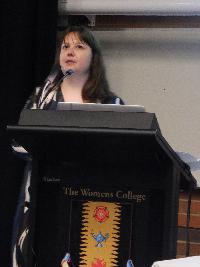| Pages in topic: [1 2 3] > | Choosing *not* to raise baby bilingually socially acceptable? Thread poster: Nicole Y. Adams, M.A.
|
|---|
Hello all,
There's been a similar thread recently but I want to put a slightly different slant on it:
My native language is German, my husband's native language is English and we just had our first baby who is now 8 weeks old. Now, most people assume we are raising him bilingually, with me speaking German to him and my husband English.
However, English is my dominant language, speaking German does not come natural to me at all and I find it impossible to sp... See more Hello all,
There's been a similar thread recently but I want to put a slightly different slant on it:
My native language is German, my husband's native language is English and we just had our first baby who is now 8 weeks old. Now, most people assume we are raising him bilingually, with me speaking German to him and my husband English.
However, English is my dominant language, speaking German does not come natural to me at all and I find it impossible to speak to my baby in German. I keep trying to force myself to speak German to him but it just does not work. I'd feel like speaking to him in an 'artificial' language and am worried I would not be able to develop a 'natural' relationship with him, as I would constantly sound stilted and 'forced' if I spoke German.
Don't get me wrong, I fully agree that it would obviously be a massive advantage if he grew up speaking German as well and I almost feel guilty about speaking to him in English. Saying that, there is no family in Germany with whom he would need to communicate in German, and we are going to relocate to Australia in the near future where employment agencies have told me the demand for German is very low (unless he wants to become a freelance translator of course ). Interestingly, I have a French friend with a British husband who feels exactly the same: She only speaks English to her child as well even though French is her mother tongue but does not come natural to her anymore. ). Interestingly, I have a French friend with a British husband who feels exactly the same: She only speaks English to her child as well even though French is her mother tongue but does not come natural to her anymore.
Now I have a couple of questions/observations:
For one I am very surprised, or should I say shocked, at the level of criticism and negative comments I get from friends and acquaintances when they learn that I do not speak German to my baby, especially being a translator myself. It seems to be socially expected and no other choice acceptable, which I find outrageous to be honest. Is it so absurd that I want to speak to him in what comes and feels natural, i.e English? (He's a "sweatheart", not a "Schatz"!)
Secondly, do you think that it would be possible for him to pick up German solely through audio tapes, children's books, DVD's and trips to Germany several times a year? Or is this a lost cause if I do not constantly actively talk to him in the language?
Is anyone else in the same situation who has a different native language than his/her partner but did not raise his/her children bilingually for whatever reason? What have been your experiences?
I look forward to your replies
Nicole ▲ Collapse
| | | |
1. Why is German not natural for you, if you say, that you are native German?
2. I am Russian and my husband is German. We have now a 2years old son, who speaks both languages, but some more German, though I speak only Russian to him. To be consequent in talking only one particular language to your son is a hard job. (I live already for 16 years in Germany.) But if you want to give an advantage (in my opinion it is always an advantage) to grow up bilingual, you should do that.
I hav... See more 1. Why is German not natural for you, if you say, that you are native German?
2. I am Russian and my husband is German. We have now a 2years old son, who speaks both languages, but some more German, though I speak only Russian to him. To be consequent in talking only one particular language to your son is a hard job. (I live already for 16 years in Germany.) But if you want to give an advantage (in my opinion it is always an advantage) to grow up bilingual, you should do that.
I have also a friend in the same situation (Russian, German). She doesnt do that. Her daughter doesnt speak Russian. But she admits, that she doesnt do this, because she is lazy to control the language she speaks to her all the time.
Of cource it is up to you what your decision will be. But in fact I would also criticise this. ▲ Collapse
| | | | Paul Adie (X) 
Germany
Spanish to English
+ ...
| I would just go with what comes naturally | Jun 27, 2008 |
Dear Nicole,
I do not have any first-hand experience of this, but I think you should just go with what feels right. I really do not think you should let yourself be pressurised into speaking German to you baby just because everyone else around you says so. I do have friends that have been in this situation:
A native English speaker, with a Thai father and a mother with Tagalog as her mother tongue. Does not know either of her parent's native languages...she ended up stu... See more Dear Nicole,
I do not have any first-hand experience of this, but I think you should just go with what feels right. I really do not think you should let yourself be pressurised into speaking German to you baby just because everyone else around you says so. I do have friends that have been in this situation:
A native English speaker, with a Thai father and a mother with Tagalog as her mother tongue. Does not know either of her parent's native languages...she ended up studying Russian and Czech, so maybe her interesting linguistic background did affect her.
A native English speaker, with a Lithuanian mother (who was also a native speaker of Russian). The son doesn't speak either of his mother's native tongues.
A native English speaker with a Polish mother. She know the odd phrase in Polish, but is by no means fluent.
You get a whole variety of situations. I suppose it's a case of what feels best for you. I'm just a bit jealous that you have reached the stage of total absorption into a culture - I'm still waiting to dream in either Spanish or Russian...
All the best!
Paul ▲ Collapse
| | | | liz askew 
United Kingdom
Local time: 03:17
Member (2007)
French to English
+ ...
| Do what you feel is natural | Jun 27, 2008 |
All I can say is do what you feel is natural to you, otherwise the "vibes" will pass on to your baby...
A happy mother usually leads to a happy baby, ....
Have a great time!
p.s. There will be loads of books/academics/counsellors out there telling you what is best for your baby. I think you and your husband will have the best interests of your baby at heart! By all means listen to others, but go with your gut instinct.
Liz
... See more All I can say is do what you feel is natural to you, otherwise the "vibes" will pass on to your baby...
A happy mother usually leads to a happy baby, ....
Have a great time!
p.s. There will be loads of books/academics/counsellors out there telling you what is best for your baby. I think you and your husband will have the best interests of your baby at heart! By all means listen to others, but go with your gut instinct.
Liz
p.s. I mean to say one or two of my friends said to me "aren't you teaching/speaking to your children in French"? My answer: I do what feels natural to me.
[Edited at 2008-06-27 13:31] ▲ Collapse
| | |
|
|
|
Vanda Nissen 
Australia
Local time: 13:17
English to Russian
+ ...
| bilingual families | Jun 27, 2008 |
Nicole Y. Adams, M.A. wrote:
Don't get me wrong, I fully agree that it would obviously be a massive advantage if he grew up speaking German as well and I almost feel guilty about speaking to him in English.
Is it so absurd that I want to speak to him in what comes and feels natural, i.e English? (He's a "sweatheart", not a "Schatz"!)
Secondly, do you think that it would be possible for him to pick up German solely through audio tapes, children's books, DVD's and trips to Germany several times a year? Or is this a lost cause if I do not constantly actively talk to him in the language?
Is anyone else in the same situation who has a different native language than his/her partner but did not raise his/her children bilingually for whatever reason? What have been your experiences?
Dear Nicole! First of all, I want to tell you that your choice is only your choice. I have been working a lot with bilingual people and I am doing a research on bilingual problems so I have some knowledge, and I want to tell you one thing - if raising a bilingual kid were such an easy thing we would have plenty of bilingual adults. But we do not have, firstly, because one of the languages will be always suppressed by another one, not telling you that children get very often confused - they start having problems with personality issues: they can not find their own place in this world. Actually, linguists are becoming now more sceptical about raising a child bilingually. This approach has both advantages and disadvantages. I can recommend you books by Anita Pavlenko and Ingrid Piller.
| | | |
If there is no family in Germany for the child to communicate with, I can't see that there is any urgency in learning German at all. Even if you did try to communicate with the child in German, you might very well find that the kid resists the language when he/she reaches school age. That's not uncommon.
We had a different situation with my daughter. My wife at that time has a very extensive family in Germany, most of them rather nice people, and it was very important to us that the... See more If there is no family in Germany for the child to communicate with, I can't see that there is any urgency in learning German at all. Even if you did try to communicate with the child in German, you might very well find that the kid resists the language when he/she reaches school age. That's not uncommon.
We had a different situation with my daughter. My wife at that time has a very extensive family in Germany, most of them rather nice people, and it was very important to us that the child be able to communicate easily with her German family when visiting from the US. So we did something that may seem a bit unusual: we spoke ONLY German to the child, even though we lived in an English-speaking country. I spoke both languages to my wife and the two stepdaughters, but only German to the baby, despite the fact that it wasn't my native language. The reactions to that in a very socially conservative rural community were sometimes interesting, and we never even got around to burning any flags
Part of the logic in our approach was that the child would learn English quickly in kindergarten (as her sisters had mastered the language in a few months at a later age) and possibly begin to lose her German or resist it. In fact, when our family circumstances changed and there were suddenly two households, this began to happen, and I think after a while I was the only one still speaking German. Maybe not, but English became very dominant in her speech for whatever reason.
There is an interesting body of literature on bilingual families and children who grow up in them, and although I have not read it extensively, I do take it up with interest when I encounter it and have some time. I have yet to discern any consistent patterns. There are lots of lovely theories and many approaches, but the reality seems to be that there are no rules to follow except to love your child, provide the most nurturing environment you can and let things develop in the most natural way for the kid in whatever environment he/she lives in. If you do that, the child will never be shortchanged no matter how many languages are known or not known. ▲ Collapse
| | | | megane_wang 
Spain
Local time: 04:17
Member (2007)
English to Spanish
+ ...
| Don't worry at all and do not allow anyone to decide for you !! | Jun 27, 2008 |
Hi Nicole,
I'm bilingual in Spanish and Catalan, mainly for geographical reasons (here we speak both languages, that's all). My dominant language is Catalan.
I have an adopted child and another is coming within a month and when I deal with them I am, first of all, their mother. I'm an educator, a supporter forever, a magical-kiss healer, a toy repair expert, an "extremely bad" soccer player when I need it, a bicycle expert, a taxi-driver... but not their language teache... See more Hi Nicole,
I'm bilingual in Spanish and Catalan, mainly for geographical reasons (here we speak both languages, that's all). My dominant language is Catalan.
I have an adopted child and another is coming within a month and when I deal with them I am, first of all, their mother. I'm an educator, a supporter forever, a magical-kiss healer, a toy repair expert, an "extremely bad" soccer player when I need it, a bicycle expert, a taxi-driver... but not their language teacher. Of course I expect that they will learn many things from me. I even can use what I know about Physics to explain them many things or encourage them to enjoy Science, but if they prefer to learn about Translation or Archaeology, or really learn something serious about Physics, they'll need a real dedicated teacher.
This is why, as far as languages are concerned, I only have a choice for them. They are my "ratolí", my "patufet", my... in catalan, because that's the language I feel comfortable with. I can express my feelings best that way. And If I want to create communication habits with my children I think this is the best choice.
If they need to learn Spanish they'll do at school; if they need to learn English, they'll do it at shool too. As far as Spanish is concerned, all their environment in Barcelona will help them to learn. As far as English is concerned, I'm taking them to the American School where they'll have the best opportunity to learn it (or I hope so).
Some people asked me why I don't speak them in Spanish from time to time too (I'm single, so there's no one else to use the other language): the reason is SO simple: because I don't feel like doing it. That's all. Others say, why I don't take them to French lessons (one came from Haiti, the second from Mali - french is spoken in both countries). The first reason is I don't feel like making them learn a language they won't be able to use frequently. The second is, that maybe in the future, depending on where life will take them, they'll prefer to have learned Chinese, German, Russian or Icelandic; who am I to decide ! !
After all, the most important thing is that they have the opportunity to learn something they enjoy. They will not be worse just because they prefer to learn to paint instead of improving their Spanish or their English.
Look: I'm bilingual Catalan - Spanish, but I translate English -> Spanish.... 98% of the time. I learned English at school.
... Why bother so much, then????
Ruth @ MW ▲ Collapse
| | | | | Welcome to motherhood | Jun 27, 2008 |
You´d better get used to being criticised about your parenting, whatever you do will be criticised and undermined by other people. The important thing is that the choices you make are because you have the child´s best interests at heart.
I sympathize. My daughter was born in Mexico and at the time I had no occasion to speak English to anyone else, so when I tried to speak to her in English it always ended up being Spanlish, which wouldn´t have helped her communication at all. ... See more You´d better get used to being criticised about your parenting, whatever you do will be criticised and undermined by other people. The important thing is that the choices you make are because you have the child´s best interests at heart.
I sympathize. My daughter was born in Mexico and at the time I had no occasion to speak English to anyone else, so when I tried to speak to her in English it always ended up being Spanlish, which wouldn´t have helped her communication at all.
However if you did opt to speak to your baby in German you could listen to German radio on the internet and do other things to convert your thinking process over to German again. There were no options like that when I had my baby.
Best wishes ▲ Collapse
| | |
|
|
|
| It will come later! | Jun 27, 2008 |
I did something like you. I had just finished language school before Christmas and my son was born at the beginning of February. I was speaking Danish at last, but not happy about switching back and forth. Everyone around us (even in Copenhagen) preferred Danish, so our son was three before he actually started speaking English himself.
We did read English books to him (you probably won't have any trouble with good German books.) And we took him to England every summer, where of cour... See more I did something like you. I had just finished language school before Christmas and my son was born at the beginning of February. I was speaking Danish at last, but not happy about switching back and forth. Everyone around us (even in Copenhagen) preferred Danish, so our son was three before he actually started speaking English himself.
We did read English books to him (you probably won't have any trouble with good German books.) And we took him to England every summer, where of course practically no one spoke Danish. It remained his dominant language for a long time, but now at age 29 he has been living in the UK for several years and taken half an MSc and a PhD in English... and is fully bilingual.
Danes are exposed to a lot of Engish all the way through school, on TV and so on, so we did keep it going. I remember an acquaintance (English) who married a Belgian and brought up her children speaking Wallonian but not English. They all regretted it later.
But don't force it is my advice. If it comes naturally, children soon learn a language, but as soon as it is a chore, they rebel!
Enjoy your son while he is little, and best of luck!
  
[Edited at 2008-06-27 19:36] ▲ Collapse
| | | | Peter Manda (X)
Local time: 22:17
German to English
+ ...
| people criticize | Jun 27, 2008 |
People criticize. Everyone has an opinion. If I continued to live my life on the approval of others I would accomplish nothing and I would not enjoy the moment I have.
When I told "people" that I was reading to our son in 4 different languages starting the day he was born, they all criticized me. They said the child shoud be raised monolingual! So in your case they are criticizing you for doing what my people told me to do! "People" are just contrarian.
Why "I" advocate... See more People criticize. Everyone has an opinion. If I continued to live my life on the approval of others I would accomplish nothing and I would not enjoy the moment I have.
When I told "people" that I was reading to our son in 4 different languages starting the day he was born, they all criticized me. They said the child shoud be raised monolingual! So in your case they are criticizing you for doing what my people told me to do! "People" are just contrarian.
Why "I" advocate reading and speaking to "my" son in many different languages during the first year is that the brain is open to language during that period and then closes itself to the main language of the environment. Now my son is 20 months. We generally only speak to him in 2 languages now and I rarely read the other languages to him, but the other day we got a Chinese language lesson DVD for children and he was standing in front of the TV repeating the words in perfect pitch.
In the end, he will probably only speak one or two languages but if he decides to learn other languages then I did the right thing for "us".
Summa summarum: Forget about people, do what you think is right for your child. ▲ Collapse
| | | | | Use the language you're comfortable with | Jun 27, 2008 |
Lesley Clarke wrote:
You´d better get used to being criticised about your parenting, whatever you do will be criticised and undermined by other people. The important thing is that the choices you make are because you have the child´s best interests at heart.
I fully agree with this remark, you will always do something that others think is wrong. Who cares, as long as you know why you made your decision?
I think it's completely up to you how, and in what language you raise your child. My husband is Hungarian, I'm Dutch, we live in the Netherlands. I wasn't too happy about raising our son bilingually, because of the social impact this would have: this would mean my husband would always have to talk Hungarian, which would be quite unpleasant in our social live. My husband didn't feel up to always talk Hungarian with our son, because he was afraid it would be difficult to have to switch constantly between both languages. And it would mean that it would be harder for him to really learn to speak Dutch.
Our son goes to Hungary with his dad once a year to see his Hungarian side of the family. Every time he comes back, he has learned a few more words. He also gets familiar with the sound, the 'flow' of the Hungarian language, which for us, dutchies, is not too easy. He also learned enough through Hungarian fairytales and 'starting to read' books. I think it will be rather easy for him to learn Hungarian when he wants to when he's older, because it will all sound familiar.
And my husband speaks Dutch fluently. So it was not such a bad decision.
I think you should use the language you feel comfortable with, communication with your child can be difficult enough, why make it harder by using a language that doesn't feel your own (even if it ís in fact, your own)?
Good luck
| | | | | Loving is giving | Jun 27, 2008 |
Kevin Lossner wrote:
... reality seems to be that there are no rules to follow except to love your child, provide the most nurturing environment you can and let things develop in the most natural way for the kid in whatever environment he/she lives in. If you do that, the child will never be shortchanged no matter how many languages are known or not known.
I wholeheartedly subscribe to what Kevin says, and in any case I suggest NEVER to listen to people: they will always find something to criticize, you just decide for yourself, as you see fit.
If you don't, if you choose a way that you know is not the best open to you (even though it might later prove wrong), you will come to regret it sooner or later. So always chose for the best and pay the price, because there is always a price to be paid for every choice.
My personal experience is that my wife refused to teach English to our child when she was so young that she'd have learned it without any effort. We lived abroad but we had already decided to come back to Italy, so she felt English was an effort she could do without.
I feel a language, ANY language is an asset even if you don't use it. Your child will never learn German the same way she could now: learning as an adult is totally different... Give him/her the gift of another language (and what is life if not communication? I ask you), just as you certainly will give him/her all things material. OK, it might take some effort, but doesn't everything else? And loving, IMHO, is giving, nothing else.
You decide on your own, but I repeat, never take a decision you might regret later because you know now it's not the best (not because your friends say so, but because you know deep down). Give your best to the child.
PS My wife now regrets her decision.
| | |
|
|
|
Juliana Brown 
Israel
Local time: 22:17
Member (2007)
Spanish to English
+ ...
| You raise your child according to what you think best. | Jun 27, 2008 |
The only rule of parenting is to follow your best instincts and throw all the rest aside. You will get advice about everything from language to vaccination, and not all will be good. Pick and choose and be confident in your choice.
Having said that...
Vanda Nissen wrote:
Dear Nicole! First of all, I want to tell you that your choice is only your choice. I have been working a lot with bilingual people and I am doing a research on bilingual problems so I have some knowledge, and I want to tell you one thing - if raising a bilingual kid were such an easy thing we would have plenty of bilingual adults. But we do not have, firstly, because one of the languages will be always suppressed by another one, not telling you that children get very often confused - they start having problems with personality issues: they can not find their own place in this world. Actually, linguists are becoming now more sceptical about raising a child bilingually. This approach has both advantages and disadvantages. I can recommend you books by Anita Pavlenko and Ingrid Piller. [/quote]
Ummm...actually, we DO have a lot of bi- and trilingual people. They are all around us, and even (suprise) on this forum. Having lived in two countries which are PACKED with wildly multilingual immigrants (Israel and Canada), I can honestly say that a large percentage of the children I knew and grew up with, as well as those I now see playing with my kids, are at least functionally bilingual. The fact that some of them tend to use one language more than the other is a function of language development and need not be interpreted as "supression" as if it were a trauma.
Second, to say that raising a child in more than one language causes personality problems sounds about as well-founded to me as the old belief that autism is caused by a mother rejecting her child. Poppycock, and verging on dangerous.
Linguists may be skeptical, but I have news for you- linguists do not raise children; parents do.
| | | | Tatty 
Local time: 04:17
Spanish to English
+ ...
| Why not throw a bit in? | Jun 27, 2008 |
Why not just throw a little German in here and there, it does seem a shame. It'll probably save your child from actually learning it in the future, and German, I'm told, is a pretty tough language to learn. You'll get used to it.
| | | | | My "5 cents" | Jun 27, 2008 |
I have a little of both ends of the experience:
My first marriage was to an American, we had a girl who is 26 today and fully bilingual. She was born in Mexico and first spoke only Spanish until age 4, we then moved to the USA and she has been bilingual since then. She is an interpreter and a translator as well !
My second husband is Mexican and speaks very little English, we have 2 daughters 11 and 13; and even though I am Mexican as well, being bilingual, and Interpr... See more I have a little of both ends of the experience:
My first marriage was to an American, we had a girl who is 26 today and fully bilingual. She was born in Mexico and first spoke only Spanish until age 4, we then moved to the USA and she has been bilingual since then. She is an interpreter and a translator as well !
My second husband is Mexican and speaks very little English, we have 2 daughters 11 and 13; and even though I am Mexican as well, being bilingual, and Interpreter and Translator, everyone expects me to teach and speak to them in both languages. I get criticized a LOT for not speaking to them in English at home, but you know what? It was my choice and I feel a lot better this way. It is sometimes a pain to listen to people criticize you, but on the other hand, they are already attending a bilingual school and even though their English command is at beginners level, their pronunciation and vocabulary is pretty good because they have heard me speak English all their lives, it is already coming to them. It is an advantage, but you do not have to take that burden if you feel more confortable in another language.
I am with you!
Lorenia ▲ Collapse
| | | | | Pages in topic: [1 2 3] > | There is no moderator assigned specifically to this forum. To report site rules violations or get help, please contact site staff » Choosing *not* to raise baby bilingually socially acceptable? | Protemos translation business management system | Create your account in minutes, and start working! 3-month trial for agencies, and free for freelancers!
The system lets you keep client/vendor database, with contacts and rates, manage projects and assign jobs to vendors, issue invoices, track payments, store and manage project files, generate business reports on turnover profit per client/manager etc.
More info » |
| | Trados Business Manager Lite | Create customer quotes and invoices from within Trados Studio
Trados Business Manager Lite helps to simplify and speed up some of the daily tasks, such as invoicing and reporting, associated with running your freelance translation business.
More info » |
|
| | | | X Sign in to your ProZ.com account... | | | | | |















